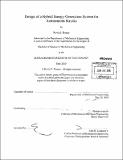Design of a hybrid energy-generation system for autonomous kayaks
Author(s)
Plumer, Kevin E. (Kevin Edward)
DownloadFull printable version (3.145Mb)
Other Contributors
Massachusetts Institute of Technology. Dept. of Mechanical Engineering.
Advisor
Henrik Schmidt.
Terms of use
Metadata
Show full item recordAbstract
The goal of this research is to design and analyze a series-hybrid energy-production system for an autonomous kayak. Currently these vehicles have limited range due to energy storage in lead acid batteries. Extending the range would give the vehicles more operating time in their environments, and allow a greater set of tests and experiments to be conducted. The system uses a 4.5 kW diesel engine coupled to a 200 A marine alternator to charge a lithium ion battery bank. The analysis here took the operating parameters of the engine and matched them to the alternator to maximize the efficiency of the system. The overall second law efficiency of the system was determined as 0.165, from the lower heating value of the diesel to the electric power delivered to the trolling motor. Each of the various components was sized accordingly for this application. The vessel will require 52 L of diesel fuel for operations lasting 30 days. The battery pack will have a useful capacity of 808 Wh based on the charging conditions of the battery. The components were arranged within the kayak in order to maintain stability, which will require modifications to the existing layout of the kayak. The generator system will add approximately 77 kg to the mass of the kayak when there is a full load of fuel; however this is within the capacity of the existing kayak shell.
Description
Thesis (S.B.)--Massachusetts Institute of Technology, Dept. of Mechanical Engineering, 2010. "June 2010." Cataloged from PDF version of thesis. Includes bibliographical references (p. 32).
Date issued
2010Department
Massachusetts Institute of Technology. Department of Mechanical EngineeringPublisher
Massachusetts Institute of Technology
Keywords
Mechanical Engineering.